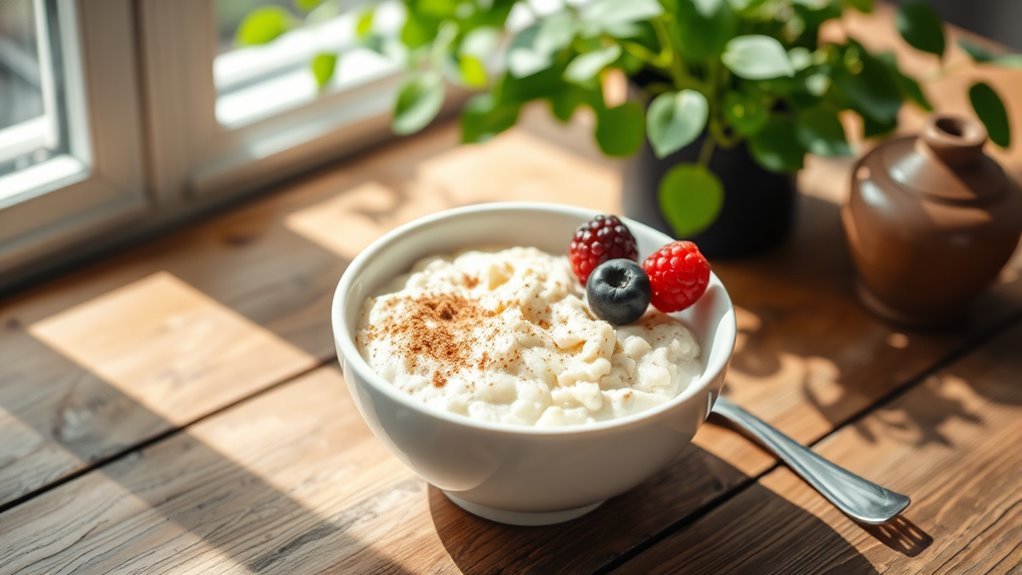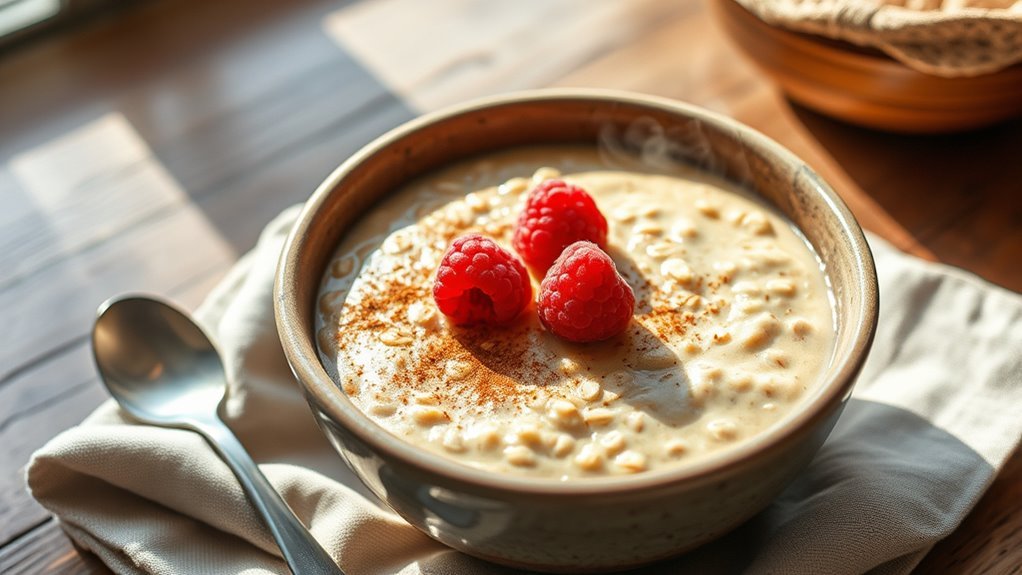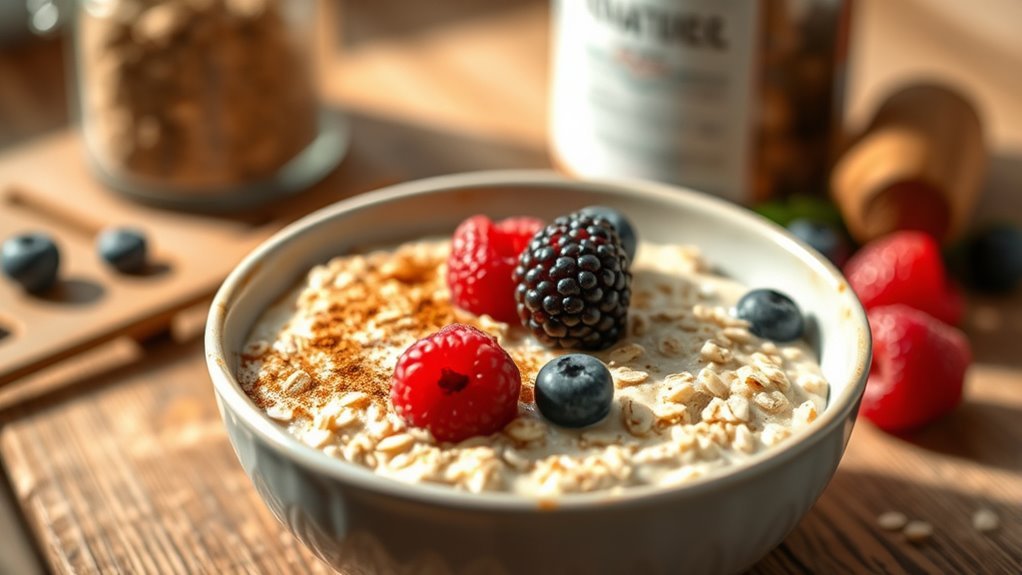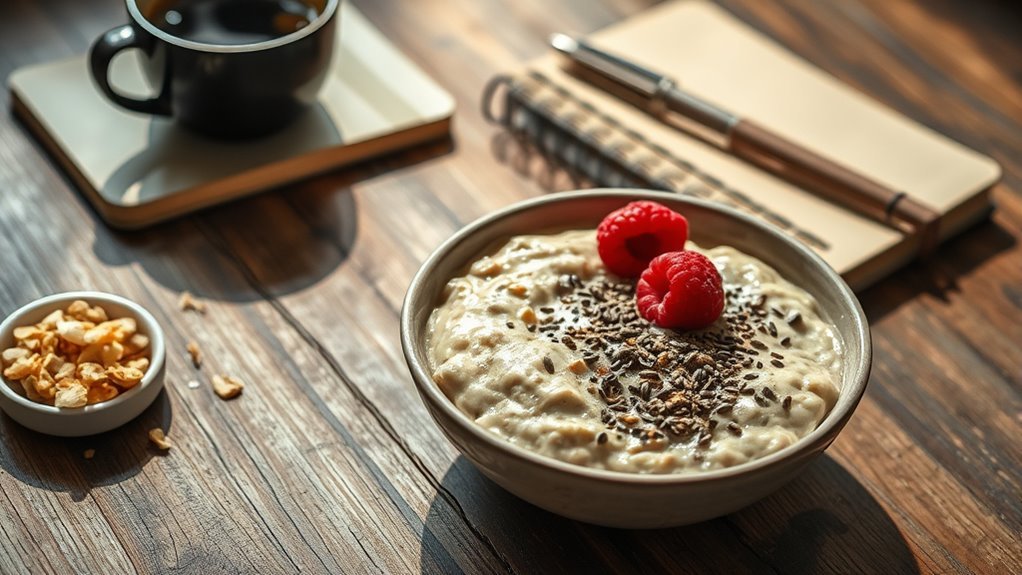Oatmeal isn’t typically recommended for a ketogenic diet because it’s high in carbohydrates, which can make it hard for you to stay in ketosis. A single serving of cooked oatmeal has about 23 grams of net carbs, consuming a significant portion of your daily carbohydrate allowance. Instead, consider keto-friendly options like chia seed pudding or almond flour pancakes. Stick around for more insights on how to balance your breakfast choices while maintaining ketosis.
Understanding the Ketogenic Diet

The ketogenic diet, often referred to as keto, is a low-carbohydrate, high-fat dietary approach that aims to shift your body’s metabolism from burning glucose to utilizing fat for fuel. To succeed on keto, you’ll need to maintain a careful macronutrient balance, typically comprising around 70% fat, 25% protein, and only 5% carbohydrates. This significant reduction in carbs creates dietary restrictions that can be challenging but rewarding. By limiting your carbohydrate intake, you encourage your body to enter a state of ketosis, where it efficiently burns fat for energy. This transformation can help many achieve weight loss and improved mental clarity. Understanding these principles allows you to navigate the diet with greater freedom and flexibility, making informed choices that align with your health goals. Metabolic adaptation can further enhance your body’s efficiency in utilizing fat for energy.
Nutritional Profile of Oatmeal

Oatmeal offers a rich nutritional profile that many consider beneficial for overall health. It’s packed with essential nutrients that can support your wellness journey. With various oatmeal varieties available, you can choose one that aligns with your dietary needs and preferences.
- High in fiber, promoting digestive health
- Contains antioxidants that may reduce inflammation
- Rich in vitamins and minerals, supporting overall well-being
- A versatile base for nutritious toppings, enhancing flavor and nutrition
These oatmeal benefits can help you feel energized and satisfied. While oatmeal is nutritious, it’s essential to evaluate how it fits into your dietary goals, especially if you’re considering a keto lifestyle. Embrace the freedom to explore wholesome options!
Carbohydrate Content in Oatmeal

When considering oatmeal on a keto diet, it’s crucial to look at its carbohydrate content carefully. Oatmeal is typically high in carbs, which can impact your daily intake and ketosis. Understanding net carbs and exploring keto-friendly alternatives can help you make informed choices. Higher carbohydrate content in oatmeal may not align with certain dietary goals.
Oatmeal’s Carb Composition
Understanding oatmeal’s carbohydrate composition is essential for anyone considering a keto diet. Oatmeal varieties differ greatly in their carb content, which can impact your keto journey. When looking at oatmeal digestion, it’s important to note that even whole grain options can pack in carbs that may hinder ketosis.
- A single serving can contain around 27 grams of carbs.
- Instant oatmeal often has added sugars that spike carb counts.
- Steel-cut oats, while less processed, still contribute to your daily carb intake.
- Your choice of oatmeal can make a difference in your keto success.
Additionally, monitoring overall daily carb intake is crucial to maintaining ketosis while enjoying your meals. Being aware of these factors empowers you to make informed decisions about incorporating oatmeal into your diet while maintaining your desired lifestyle.
Net Carbs Explained
While many people enjoy oatmeal for its nutritional benefits, it’s important to grasp the concept of net carbs, especially on a keto diet. Net carbs are calculated by subtracting fiber content from total carbohydrates, as fiber isn’t digested and doesn’t raise blood sugar levels. For example, one cup of cooked oatmeal contains around 27 grams of carbs but also provides about 4 grams of fiber. This means the net carbs would be approximately 23 grams. On a keto diet, where you typically aim for 20-50 grams of net carbs daily, oatmeal can quickly take up a significant portion of your carb allowance. Understanding net carbs helps you make informed choices that align with your dietary goals while enjoying the freedom of varied foods. Additionally, considering low-carb alternatives can help maintain variety in your meals without sacrificing your keto adherence.
Keto-Friendly Alternatives
If you’re looking for keto-friendly alternatives to oatmeal, you’re in luck, as there are several options that can fit seamlessly into your low-carb lifestyle. These oatmeal substitutes provide a satisfying breakfast without the carb overload. Consider trying:
- Chia seed pudding: Packed with fiber and healthy fats.
- Flaxseed meal: A versatile base for porridge-like dishes.
- Coconut flour: A low-carb option that’s high in fiber.
- Almond flour: Great for making keto cereals and baked goods.
These alternatives not only keep your carb count low but also offer delicious ways to enjoy breakfast. By incorporating these keto cereals, you can maintain your energy levels and feel satisfied while staying true to your dietary goals. Additionally, these substitutes align well with the macronutrient ratios of the keto diet, ensuring you stay on track with your nutritional needs. Enjoy the freedom of variety in your meals!
The Impact of Oatmeal on Ketosis
Although oatmeal is often hailed for its health benefits, its impact on ketosis can be significant for those following a ketogenic diet. The primary concern is the carbohydrate content in oatmeal, which can disrupt ketosis effects by elevating insulin levels and hindering fat-burning. If you indulge in oatmeal, even in small portions, you might find it challenging to maintain your state of ketosis. Additionally, the higher carbohydrate content in foods like oatmeal makes it crucial to monitor your intake to stay in ketosis.
Fortunately, there are several oatmeal alternatives that fit well within the keto framework. Options like chia seeds, flaxseed meal, or almond flour can provide similar textures and nutrients without the high carb count. By choosing these alternatives, you can enjoy a satisfying breakfast while staying true to your keto goals and embracing the freedom that comes with a well-planned diet.
Potential Benefits of Oatmeal
Oatmeal can offer several potential benefits that contribute to overall health, particularly when consumed in moderation. While it may not fit perfectly into a strict keto diet, understanding its oatmeal benefits can help you appreciate its health advantages.
- Heart Health: Oatmeal’s soluble fiber can lower cholesterol levels, promoting cardiovascular wellness.
- Digestive Support: The fiber in oatmeal aids digestion and keeps you regular.
- Sustained Energy: Oatmeal provides a slow release of carbohydrates, keeping your energy levels steady throughout the day.
- Nutrient-Rich: It’s packed with essential vitamins and minerals, making it a nutritious choice.
Balancing your choices allows you to enjoy these oatmeal benefits while keeping your health goals in mind. Remember, moderation is key!
Low-Carb Alternatives to Oatmeal
While oatmeal is often celebrated for its health benefits, those following a keto diet may seek out low-carb alternatives that align better with their nutritional goals. Oatmeal substitutes like chia seeds and flaxseed meal are excellent choices, rich in fiber and healthy fats. You might also consider almond flour or coconut flour for a low-carb base in recipes. Psyllium husk can add texture while keeping carbs low. For a unique twist, try zucchini oats or cauliflower rice, which can mimic the texture of oatmeal while providing fewer carbs. Hemp hearts and sunflower seeds can serve as nutritious toppings, enhancing flavor and nutritional value without compromising your keto journey. Additionally, incorporating chia seeds’ high fiber content can help promote fullness and support digestive health.
Breakfast Ideas for a Keto Diet
Looking for delicious breakfast ideas that fit your keto diet? You don’t have to sacrifice flavor for health. Here are some satisfying options to kickstart your day:
- Keto smoothies with spinach and avocado for a creamy boost
- Egg muffins packed with veggies for a grab-and-go treat
- Savory oatmeal made with flaxseed porridge for a warm, comforting meal
- Almond flour pancakes drizzled with coconut yogurt for a sweet finish
These meals not only keep you in ketosis but also provide the freedom to enjoy your mornings. Pair them with bulletproof coffee to enhance focus or enjoy chia pudding overnight for a nutty, fulfilling start. Embrace the variety and creativity of keto-friendly breakfasts! Additionally, consider incorporating low-carb alternatives like almond or coconut milk to maintain your keto goals.
Tips for Staying in Ketosis
To stay in ketosis, it’s important to track your carbohydrate intake carefully, ensuring you don’t exceed your daily limit. Opting for high-fat foods can help maintain energy levels while promoting fat utilization. Additionally, staying hydrated daily supports overall health and can help curb cravings that may lead you off track. Understanding recommended daily carb intake is essential for maintaining ketosis and achieving your health goals.
Track Your Carbohydrate Intake
Tracking your carbohydrate intake is essential for maintaining ketosis, especially if you’re new to the keto diet. By engaging in carb tracking, you empower yourself to make informed choices that align with your goals. Mindful eating becomes a vital practice, allowing you to savor each bite while staying aware of your carb limits. Here are some tips to keep you on track:
- Keep a food diary to monitor your carbs daily.
- Use apps to simplify carb tracking and meal planning.
- Focus on whole, nutrient-dense foods to stay satisfied.
- Set realistic goals to avoid feelings of deprivation.
- Remember that aiming for about 20 to 50 grams of net carbs per day is crucial for achieving ketosis.
Choose High-Fat Foods
Maintaining a low carbohydrate intake is only part of the equation for staying in ketosis; choosing high-fat foods is equally important. Incorporating keto fats into your meals guarantees your body has the energy it needs to burn fat effectively. Opt for high-fat snacks like avocados, nuts, and cheese, which can keep you satisfied and help sustain your energy levels throughout the day. These foods are not only delicious but also essential for maintaining ketosis. When you prioritize high-fat options, you empower yourself to enjoy your meals without feeling deprived. Remember, it’s about finding balance and freedom in your food choices while still supporting your keto lifestyle. Embrace these high-fat foods, and you’ll stay on track with your goals.
Stay Hydrated Daily
Hydration plays an essential role in supporting your ketogenic journey. Staying well-hydrated can enhance your overall well-being and help maintain ketosis. Here are some hydration tips to keep you on track:
- Boost your energy levels and fight fatigue
- Support your metabolism for effective fat burning
- Improve mental clarity and focus
- Minimize cravings and help with appetite control
The benefits of hydration are numerous, especially when you’re on a keto diet. Water not only aids in digestion but also helps flush out toxins. Aim for at least 8 cups a day, and consider adding electrolytes to combat any imbalances. Remember, staying hydrated gives you the freedom to enjoy your keto lifestyle without feeling sluggish or deprived.
Combining Oatmeal With Keto-Friendly Foods
While oatmeal is typically high in carbohydrates, you can still enjoy it on a keto diet by combining it with keto-friendly foods. By choosing the right oatmeal toppings and keto pairings, you can create a satisfying meal that fits your lifestyle.
Here’s a simple guide to help you combine oatmeal with keto-friendly options:
| Oatmeal Toppings | Keto Pairings |
|---|---|
| Almond butter | Chia seeds |
| Coconut flakes | Heavy cream |
| Walnuts | Unsweetened cocoa |
| Berries (in moderation) | MCT oil |
| Greek yogurt (unsweetened) | Cinnamon |
These combinations can help lower the carb load while adding flavor and texture. Enjoy the freedom to customize your oatmeal while staying aligned with your keto goals!
Making Informed Choices on Your Keto Journey
Steering through the keto diet can feel overwhelming at times, but making informed choices is key to your success. To thrive, consider these essential strategies:
- Embrace meal planning to stay on track and reduce stress.
- Explore food substitutions that align with your keto goals.
- Prioritize whole, nutrient-dense foods for ideal health.
- Stay flexible and open to adjustments as you learn what works for you.
When you make thoughtful choices about what you eat, you empower yourself on this journey. Remember, it’s about finding freedom within the guidelines of keto. With a bit of research and creativity, you can enjoy delicious meals and maintain a fulfilling lifestyle while reaching your health objectives. Stay informed, and you’ll navigate this path with confidence.
Frequently Asked Questions
Can I Eat Oatmeal Occasionally on a Keto Diet?
You can eat oatmeal occasionally on a keto diet, but it’s best to be cautious. While oatmeal has benefits like fiber and nutrients, it’s high in carbs, which can kick you out of ketosis. If you crave that warm bowl, consider keto alternatives like chia seeds or flaxseed meal, which offer similar textures and health benefits without the carbs. Balance is key, so enjoy your oatmeal in moderation if you choose to indulge!
What Are the Long-Term Effects of Oatmeal on Ketosis?
Oatmeal’s like a double-edged sword on your keto journey. Its glycemic impact can spike blood sugar levels, potentially disrupting ketosis, especially if consumed regularly. Long-term, this could affect your ketosis blood levels, making it harder to maintain your desired state. While occasional enjoyment might be fine, relying on oatmeal could steer you away from your keto goals. It’s all about finding balance and listening to your body’s needs.
Are There Any Keto-Friendly Oatmeal Brands Available?
Yes, there are keto-friendly oatmeal brands available. You might want to explore options like keto oatmeal alternatives made from flaxseed or chia seeds, which are low in carbs and high in fiber. Brands like “Better Oats” and “Keto Oatmeal” provide low carb cereals that fit your dietary needs. Always check the nutrition labels to verify they align with your carb limits, giving you the freedom to enjoy a satisfying breakfast while staying in ketosis.
How Does Oatmeal Affect Weight Loss on a Keto Diet?
Oatmeal can hinder weight loss on a keto diet due to its high carb content. Since the keto approach emphasizes low carbohydrate intake to promote fat burning, incorporating oatmeal may push you over your daily carb limit. While oats offer fiber and nutrients, they can disrupt ketosis, which is essential for effective weight loss on this diet. If you’re seeking freedom in your dietary choices, consider alternatives that align better with keto principles.
Can I Mix Oatmeal With Keto-Approved Sweeteners?
Sure, you can mix oatmeal with keto-approved sweeteners, but why would you? Oatmeal itself isn’t typically keto-friendly due to its high carb content. Instead, consider oatmeal alternatives like chia seeds or flaxseed meal, which can be sweetened with keto sweeteners like erythritol or stevia. These options allow you to enjoy a similar texture and flavor without compromising your carb limits, giving you the freedom to stay in ketosis while satisfying your cravings.
References
- https://www.healthline.com/nutrition/oatmeal-on-keto
- https://www.dietdoctor.com/low-carb/oatmeal
- https://www.medicalnewstoday.com/articles/324213
- https://www.ncbi.nlm.nih.gov/pmc/articles/PMC6313445/
- https://www.webmd.com/diet/obesity/what-is-keto-diet
- https://www.verywellfit.com/what-is-the-ketogenic-diet-5119062
- https://www.rd.com/article/can-you-eat-oatmeal-on-keto-diet/


